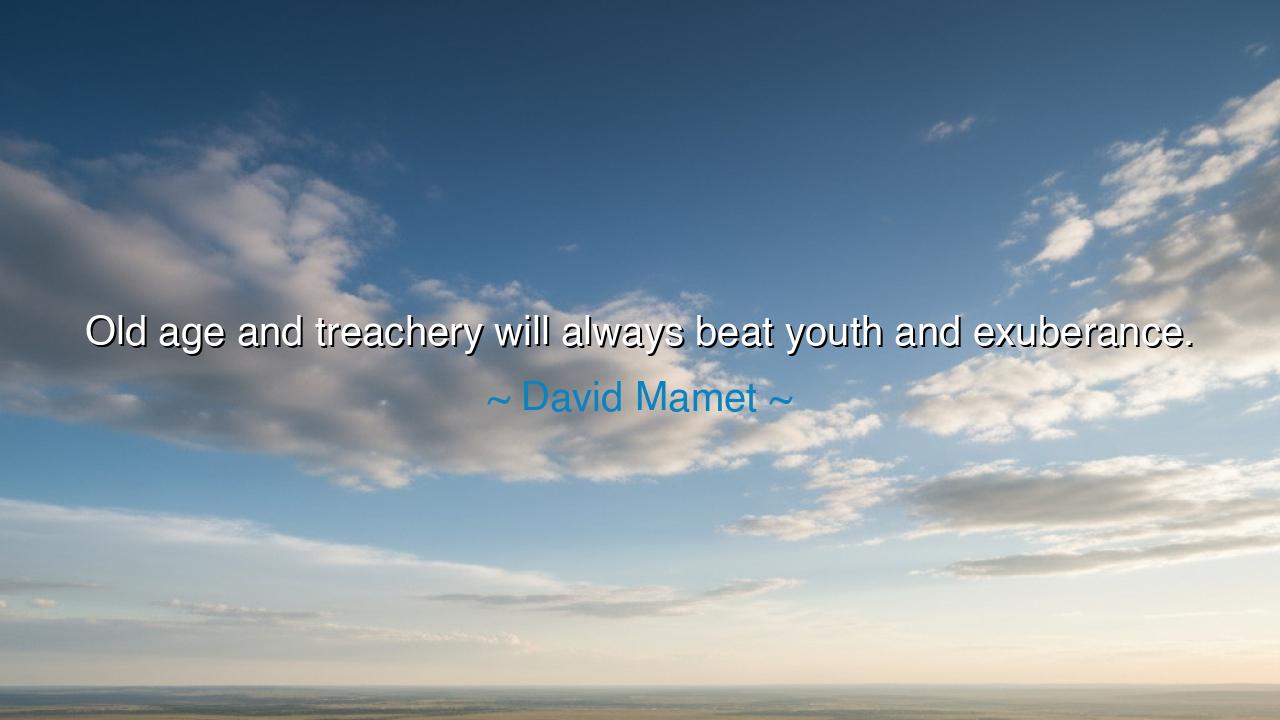
Old age and treachery will always beat youth and exuberance.






"Old age and treachery will always beat youth and exuberance." These words from David Mamet encapsulate the unspoken truth of the human condition, one that acknowledges the power of experience and cunning in the face of youthful energy and idealism. Mamet’s quote speaks to the age-old reality that youth, with all its vigor and idealism, can often be outmatched by the wisdom of age and the subtlety of treachery. It is not merely a statement of power dynamics, but a lesson in the complexity of life itself, where strength and honesty are often pitted against strategy and manipulation, and where the young may find themselves outwitted by those who have lived through more, seen more, and learned how to maneuver in a world filled with both open battles and hidden conflicts.
The ancients often spoke of the balance between youth and age, understanding that youth is full of passion, energy, and hope, while old age brings with it the treasures of wisdom and experience—but also, perhaps, the tendency to rely on strategic advantage over raw power. The Greeks, in their great epics, often celebrated the bravery and idealism of young heroes, yet they also warned of the dangers that awaited those who did not learn from their elders. The myth of Odysseus, for example, is filled with his use of wit, subterfuge, and cleverness to overcome his enemies, all traits that come not from youthful exuberance but from the hard-earned wisdom of his years. His journey is a testament to Mamet’s insight: though he was once a young warrior full of vigor, it was his cunning in his later years that allowed him to triumph over those who were stronger, younger, and seemingly more capable.
One of the clearest examples of old age and treachery triumphing over youthful zeal comes from the Roman Empire—particularly the story of Julius Caesar and Pompey the Great. Pompey, though older than Caesar, was a man of great military might and reputation, embodying the raw energy of youth in his early campaigns. However, it was Caesar’s strategic brilliance, cultivated over years of experience and tempered by cunning, that allowed him to outmaneuver Pompey in the end. In their power struggle, Pompey’s youthful ambition was no match for Caesar’s calculated use of alliances, propaganda, and the eventual betrayal of his former ally. Despite Pompey’s strength, it was Caesar's treachery—his ability to play the long game—that allowed him to emerge victorious. This story underscores the reality that wisdom, even when paired with deception, can often overcome the more straightforward, albeit passionate, youth.
Mamet’s words also evoke the political realities of the modern world, where age and experience often hold sway over idealistic youth. Take, for instance, the life of Winston Churchill during World War II. As a younger man, Churchill was dismissed as an out-of-touch figure, too embroiled in past glories to make a meaningful impact in modern politics. But with the rise of Hitler and the challenges of World War II, Churchill’s experience, resolve, and ability to manipulate both public perception and political alliances proved to be more effective than the exuberance of younger, more idealistic leaders who sought different, perhaps more naive, solutions. His success was not in youthful vigor, but in his ability to navigate the intricacies of political treachery and survival.
The deeper lesson in Mamet’s quote is the balance between youthful energy and the wisdom of age, as well as the recognition that while honesty and strength are valuable, there is power in understanding the darker side of human nature—the ability to use treachery, manipulation, and strategy to win when brute force is not enough. This is not a moral endorsement of deception, but a realization that life is not simply won by idealism, but by understanding, strategy, and the courage to confront hard truths.
In practical terms, Mamet’s quote calls for a deeper understanding of how we navigate the world—to not rely solely on youthful passion, but also to learn from the wisdom that comes with age and experience. It urges us to recognize that in life’s struggles, there are long-term battles, and sometimes, patience and subtlety win where energy and passion might falter. It also suggests that we must not only be bold and courageous in our youth, but also wise enough to learn the art of strategy and adaptation as we grow older. Strength alone is not enough; it is the mind and the heart that must be cultivated to complement the body’s power.
Thus, the ultimate lesson of Mamet’s words is this: do not underestimate the power of experience, nor the subtlety of treachery in navigating life’s challenges. Whether in youth or old age, we must be prepared to adapt, to learn, and to understand that true victory is not always about raw power, but about the ability to read the situation, to understand the hidden forces at play, and to act with foresight. Just as Odysseus knew when to fight and when to outwit, so must we understand that sometimes, wisdom and strategy will triumph where youth and zeal alone cannot.






AAdministratorAdministrator
Welcome, honored guests. Please leave a comment, we will respond soon